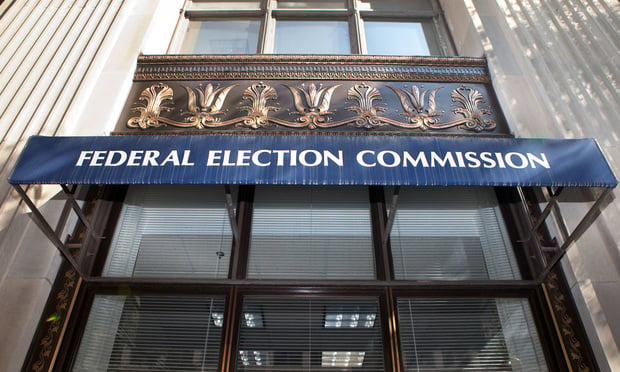Michael Cohen's $130K Payment to Stormy Daniels: What's Next at the FEC
Trump Organization lawyer Michael Cohen's $130,000 payment to adult actress Stephanie Clifford—Stormy Daniels on stage—is the subject of a complaint at the FEC. Here's what to know about the review process.
March 08, 2018 at 07:30 PM
6 minute read
The original version of this story was published on National Law Journal
 Federal Election Commission in Washington, D.C.
Federal Election Commission in Washington, D.C. An adult film actress. An allegation of an extramarital affair with Donald Trump. A $130,000 payment, made days before the presidential election.
And that's just what was known in January, when The Wall Street Journal first reported news that Trump Organization lawyer Michael Cohen facilitated a $130,000 payment to Stephanie Clifford, the actress known professionally as Stormy Daniels.
 Michael Cohen
Michael CohenScrutiny has ramped up considerably in the weeks since then, as the public interest group Common Cause pushes for an investigation by the Federal Election Commission and U.S. Justice Department into whether the Trump campaign broke any election laws by not disclosing the payment.
Cohen has publicly defended the October 2016 payment, saying he used personal funds and that it was “not a campaign contribution or a campaign expenditure by anyone.” A lawyer for Cohen, Stephen Ryan of McDermott Will & Emery, wasn't reached for comment Thursday.
Here are some considerations as the dispute over the $130,000 payment plays out.
Fuel for the Common Cause complaint?
On Tuesday, Clifford, represented by Newport Beach, California, lawyer Michael Avenatti, sued Trump and Essential Consultants, the private company Cohen established to make the $130,000 payment. She argued her nondisclosure agreement never took effect because Trump did not sign it. Common Cause said the lawsuit provided fodder for the group's allegations that Cohen's payment was an unreported and illegal in-kind campaign contribution.
Paul S. Ryan, vice president of policy and litigation at Common Cause, said Thursday the group was drafting an amendment to its original complaint to note at least two claims that Clifford made in her lawsuit: Trump had a direct and personal involvement in the payment and that it was meant to help him win the presidential race.
“After discovering Ms. Clifford's plans” to reveal the past affair, Clifford's lawsuit in California states, “Mr. Trump, with the assistance of his attorney Mr. Cohen, aggressively sought to silence Ms. Clifford as part of an effort to avoid her telling the truth, thus helping to ensure he won the presidential election.”
The FEC's general counsel makes the first move.
Common Cause's complaint, filed Jan. 22, set off an automatic review by the FEC general counsel's office, which is tasked with recommending whether the commission should open an investigation.
Under the process, the FEC had five days to notify the subjects of the complaint—the Trump campaign and Trump Organization. In February, when Cohen first acknowledged the payment and defended it as lawful, he told The New York Times that he had provided a statement to the FEC.
Lisa Stevenson, the commission's general counsel for law, has served as acting general counsel since September 2016. She joined the FEC in 2012 from Zuckerman Spaeder, where she was a partner.
In 2015, after the FEC went more than two years without appointing a permanent general counsel, the Center for Public Integrity reported that “lawyers aren't exactly clamoring to be hired by an agency deemed by its own leader to be 'worse than dysfunctional.'” (That leader, Ann Ravel, left the FEC last year.)
Common Cause could turn to the courts if—after 120 days—the FEC hasn't taken any action on the complaint.
Wiley Rein partner Carol Laham said she would be surprised if the FEC voted within the 120-day mark on whether to open an investigation.
“That would be warp speed, because the counsel's office needs to research the legal issues,” Laham, a former FEC attorney, said Thursday. “And then they need to take into account what the respondents have said, and they draft a report up to the FEC's commissioners. None of that happens very quickly.”
The FEC is shorthanded, and that means they need every vote.
The six-seat commission is down to four members—two Democrats and two Republicans. It's a state of short-handedness that might have been exacerbated had the chair, Matthew Petersen, not withdrawn his name from a federal judgeship consideration. Petersen had been nominated for a seat on the U.S. District Court for the District of Columbia.
Trump last year nominated James “Trey” Trainor—an Akerman partner in Austin, Texas—for one of the vacant seats at the FEC. If the FEC still has only four sitting commissioners when the time comes for a vote, it would take a unanimous decision to approve any investigation into the $130,000 payment. FEC rules require at least four votes to take any official action.
“It's very likely, I think, that the campaign will argue that there's no legal violation here because it's not a campaign issue, it's a personal issue,” Laham said. “And that as a result, there haven't been allegations of anything for which to find a violation.”
After any investigation, the FEC would vote on whether to find there was a violation. “Possible outcomes,” according to the FEC, “can range from a letter reiterating compliance obligations to a conciliation agreement, which may include a monetary civil penalty.”
And what about the Justice Department?
Many election law experts have drawn comparisons between the $130,000 payment to Cliffords and the nearly $1 million in payments supporters of former U.S. Sen. John Edwards made to support his pregnant mistress during the 2008 presidential campaign.
The Justice Department brought charges against Edwards over the payments, which funded private jets, luxury hotels and housing for his mistress but never passed through campaign accounts. Under the Justice Department's theory, the payments amounted to donations because they were used to hide his extramarital affair and stave off damage to his presidential campaign. The Justice Department in 2012 dismissed the charges after a jury deadlocked on five felony counts and acquitted him on one charge.
Common Cause sent a copy of its complaint to Deputy Attorney General Rod Rosenstein and urged the Justice Department to open its own investigation.
Read more:
Meet the SoCal Litigator Behind the Stormy-Trump Drama
Allegations of Trump Payment to Porn Star Places Delaware LLCs in Spotlight
FEC Commissioner Goodman Leaves Post for Wiley Rein
Trump's Big Law FEC Nominee Under Fire for Tweets, Views
Meet Matthew Petersen, DC Court Nom Who Flunked Senator's Pop Quiz
This content has been archived. It is available through our partners, LexisNexis® and Bloomberg Law.
To view this content, please continue to their sites.
Not a Lexis Subscriber?
Subscribe Now
Not a Bloomberg Law Subscriber?
Subscribe Now
NOT FOR REPRINT
© 2025 ALM Global, LLC, All Rights Reserved. Request academic re-use from www.copyright.com. All other uses, submit a request to [email protected]. For more information visit Asset & Logo Licensing.
You Might Like
View All
An ‘Indiana Jones Moment’: Mayer Brown’s John Nadolenco and Kelly Kramer on the 10-Year Legal Saga of the Bahia Emerald


Travis Lenkner Returns to Burford Capital With an Eye on Future Growth Opportunities

Legal Speak's 'Sidebar With Saul' Part V: Strange Days of Trump Trial Culminate in Historic Verdict
1 minute readTrending Stories
Who Got The Work
J. Brugh Lower of Gibbons has entered an appearance for industrial equipment supplier Devco Corporation in a pending trademark infringement lawsuit. The suit, accusing the defendant of selling knock-off Graco products, was filed Dec. 18 in New Jersey District Court by Rivkin Radler on behalf of Graco Inc. and Graco Minnesota. The case, assigned to U.S. District Judge Zahid N. Quraishi, is 3:24-cv-11294, Graco Inc. et al v. Devco Corporation.
Who Got The Work
Rebecca Maller-Stein and Kent A. Yalowitz of Arnold & Porter Kaye Scholer have entered their appearances for Hanaco Venture Capital and its executives, Lior Prosor and David Frankel, in a pending securities lawsuit. The action, filed on Dec. 24 in New York Southern District Court by Zell, Aron & Co. on behalf of Goldeneye Advisors, accuses the defendants of negligently and fraudulently managing the plaintiff's $1 million investment. The case, assigned to U.S. District Judge Vernon S. Broderick, is 1:24-cv-09918, Goldeneye Advisors, LLC v. Hanaco Venture Capital, Ltd. et al.
Who Got The Work
Attorneys from A&O Shearman has stepped in as defense counsel for Toronto-Dominion Bank and other defendants in a pending securities class action. The suit, filed Dec. 11 in New York Southern District Court by Bleichmar Fonti & Auld, accuses the defendants of concealing the bank's 'pervasive' deficiencies in regards to its compliance with the Bank Secrecy Act and the quality of its anti-money laundering controls. The case, assigned to U.S. District Judge Arun Subramanian, is 1:24-cv-09445, Gonzalez v. The Toronto-Dominion Bank et al.
Who Got The Work
Crown Castle International, a Pennsylvania company providing shared communications infrastructure, has turned to Luke D. Wolf of Gordon Rees Scully Mansukhani to fend off a pending breach-of-contract lawsuit. The court action, filed Nov. 25 in Michigan Eastern District Court by Hooper Hathaway PC on behalf of The Town Residences LLC, accuses Crown Castle of failing to transfer approximately $30,000 in utility payments from T-Mobile in breach of a roof-top lease and assignment agreement. The case, assigned to U.S. District Judge Susan K. Declercq, is 2:24-cv-13131, The Town Residences LLC v. T-Mobile US, Inc. et al.
Who Got The Work
Wilfred P. Coronato and Daniel M. Schwartz of McCarter & English have stepped in as defense counsel to Electrolux Home Products Inc. in a pending product liability lawsuit. The court action, filed Nov. 26 in New York Eastern District Court by Poulos Lopiccolo PC and Nagel Rice LLP on behalf of David Stern, alleges that the defendant's refrigerators’ drawers and shelving repeatedly break and fall apart within months after purchase. The case, assigned to U.S. District Judge Joan M. Azrack, is 2:24-cv-08204, Stern v. Electrolux Home Products, Inc.
Featured Firms
Law Offices of Gary Martin Hays & Associates, P.C.
(470) 294-1674
Law Offices of Mark E. Salomone
(857) 444-6468
Smith & Hassler
(713) 739-1250






